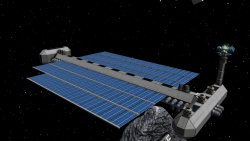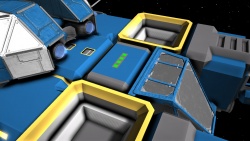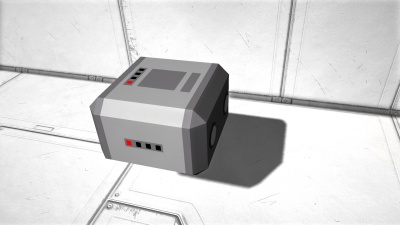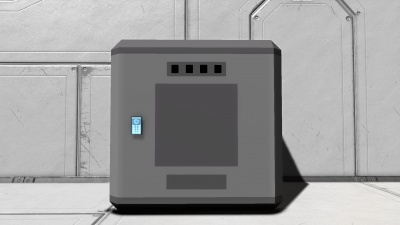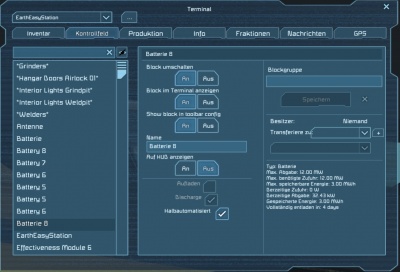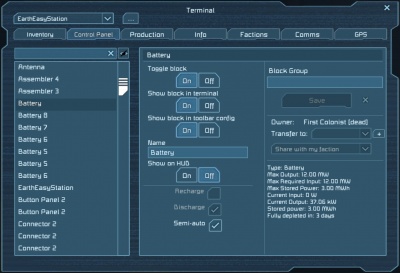Difference between revisions of "Battery/de"
m |
|||
| Line 190: | Line 190: | ||
</div> | </div> | ||
| − | [[Category:Power Blocks]] | + | [[Category:Power Blocks]][[Category:Steel Plate]] |
Revision as of 13:18, 2 March 2016
| Bemerkung |
|---|
| Diese Seite beinhaltet Informationen einer älteren Version und ist nicht aktuell. Editoren werden gebeten diese Seite zu aktualisieren. Bitte die Englische Seite als Referenz verwenden. |
Übersicht
Eingeführt wurde die Batterie mit dem Update 01.039.010, Sie ist ein Einzelblock und übernimmt Funktionen des kleinen Reaktors, in dem sie angeschlossene Blöcke mit Energie versorgen kann. Sie hat keine Verbrauchsmaterialien muss aber von Solarzellen, einem großen Reaktor, und/oder einem kleinen Reaktor aufgeladen warden bevor sie verwendet werden kann.
Seit dem Update 01.105, hat die Batterie eine Ladung von 30% nachdem sie gebaut wurde und kann sofort verwendet werden. Wie vorher ist es nicht möglich Energiezellen beim Zerlegen zu erhalten, man erhält nur Altmetal und verliert großen Mengen an Nickelbarren und Siliziumwafer.
Benutzung
Die Batterie ist eine alternative Lösung zum Energiemanagment, kann überall plaziert werden und muss nicht mit Uranbarren versorgt werden. Sie kann auch als Notreserve bei fälligen Reperaturen verwendet werden.
Control Panel
- Max Output - Maximum amount of power the battery can output to the grid
- Max Required Input - Maximum amount of power the battery can receive when in recharge state
- Max Stored Power - Maximum amount of power that can be stored on battery
- Current Input - The amount of power that the battery is currently drawing from the grid
- Current Output - The amount of power that the battery is currently providing to the grid
- Stored Power - The remaining amount of power that is stored within the battery
- Fully Depleted In - Time remaining till the battery is depleted of stored power
- Fully Charged In - Time remaining till the battery is fully charged.
Recharging
Although a newly constructed battery will have some charge already available, providing power instantly once complete. The main purpose of the battery is to store and discharge power as needed. A ship may also recharge its battery through Connectors by drawing power from the other side while docked. This does not cost extra power. However, recharging from any source will only work at 80% efficiency rate which incurs a 20% penalty on recharging, meaning the block needs 20% more power for the amount of power returned to the grid.
- Indicators on the battery itself inform the player its status of stored power.
Recharge Toggle
A Battery can recharge regardless of whether its Recharge setting is toggled or not, but if it's set to Recharge it will ONLY recharge and will not discharge or provide power. During this state, the battery will only draw power from the surrounding grid to store in its reserves. It will not discharge again till the player toggles "recharge" once again. Be aware that the charging process is not 100% efficient. Regardless of where the energy is coming from, only about 83.33% of the energy will actually be stored in the battery, the remainder being wasted due to an inherent inefficiency.
Discharge Toggle
Once a battery has enough charge in it it may be set to only discharge it's stored power into the grid, the battery should take priority over reactors (using fuel) but not active solar panels - this may vary due to subgrids and etc. A battery can discharge its stored power whether the it's discharge setting is toggled or not, but toggling the discharge means it will ONLY discharge and not at all draw power from other power sources such as other batteries or reactors.
When neither Discharge or Recharge is toggled
During this state which is the default state of a newly built battery, it will recharge automatically if there is any surplus power it can draw from and discharge automatically if there is a shortfall in power supply that is if there is more power being drawn that otherwise available without the battery's reserves. This is unwise as it may if Reactors are present quickly recharge and then discharge this stored energy, since the battery's charging is inefficient you essentially lose fuel in the process.
Semi-Auto Toggle
This mode will enable the battery to automatically recharge when at 0%, and then discharge when at 100%. In other words, it will automatically recharge and power the grid without player intervention.
Charging with Reactors
While reactors can recharge batteries, the efficiency is only about 80%, as noted above. Reactors due to high output can recharge the battery quickly, however this is considered very inefficient. Merely converting the stored energy in Uranium Ingots, to stored energy in batteries - which is not 1:1 conversion. Resulting in essentially losing 20% of the fuel in the process with inefficiency [3.60 MWh of Reactor output -> 3.00 MWh of Battery output after being fully charged].
Charging with Solar panels
While a single Solar Panel does not have the same power output as reactors, it is considered "free" energy since no fuel is spent to generate power. It will however be painfully slow with a single or a few panels being used and suffers the same efficiency penalty as do Reactors, a single large Solar Panel operating at peak effectiveness (120 KW) will take upwards of 62 days to be fully charged - so ideally a large array of solar panels should be used.
While 30+ panels appears impractical for a shorter recharge, its more logical to create such things as recharge satellites that your ships can dock with to recharge their batteries.
Power Output
Once charged, the battery can begin to power the grid it is placed on. It has nearly the same output capabilities as a small reactor with an output of 12MW on large ships/stations, and 4.32MW on small ships. The battery life can vary depending on power usage. On a typical small ship can last anywhere from 2-4 hours while in constant use (moving, mining, etc). Large ships will use far more power, and a single battery will only sustain a default red ship for 2 hours while idling, or 15 minutes of constant movement.
Media
Tips
- See Electricity for more information.
Known Issues
- While the grid does correctly prioritize power sources for everything directly connected to it, once sub-grids (such as grids accessed through rotors, pistons, connectors, etc) also supply or draw power the battery can become confused.
Programming
Update History
| Update 01.039.010 |
|
Update 01.040 |
|
Update 01.096 |
|
Update 01.105 |
|
